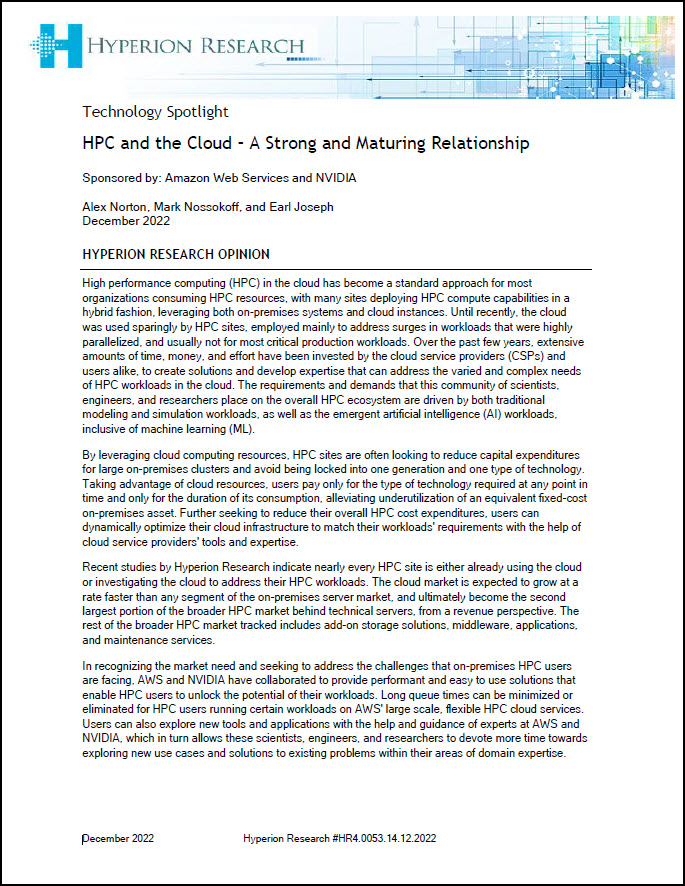In this Let’s Talk Exascale podcast, Sameer Shende from the University of Oregon describes progress on the Extreme-scale Scientific Software Stack. E4S is a community effort to provide open-source software packages for developing, deploying, and running scientific applications on HPC platforms. “Container technology is promising because it enables the user to take an existing set of libraries and tools, consider the dependency metrics of a particular software product, and deploy the software efficiently. And there’s only one kernel that’s running when a container is deployed, unlike other virtualization approaches. So it’s very efficient.”
Containerized Convergence of Big Data and Big Compute
Christian Kniep gave this talk at HPCKP’19. “This talk will dissect the convergence by refreshing the audiences’ memory on what containerization is about, segueing into why AI/ML workloads are leading to fully fledged HPC applications eventually and how this will inform the way forward. In conclusion Christian will discuss the three main challenges `Hardware Access`, `Data Access` and `Distributed Computing` in container technology and how they can be tackled by the power of open source, while focusing on the first.”
Singularity Enterprise to Accelerate Adoption of Containers with Cryptographically Verifiable Trust
Today Sylabs announced that Singularity Enterprise is now generally available as a self-hosted offering, making it faster and easier for businesses to adopt containerization across their production environments. In private beta since April of this year, Singularity Enterprise has grabbed the attention of DevOps and IT infrastructure teams at leading businesses and government organizations for expediting containerized workloads from development into production.
Singularity 3.3.0 Goes GA
Today Sylabs announced the Generally Available Release of Singularity 3.3.0. As the premier Container platform for performance-sensitive workloads, this release of Singularity focused on quality and stability. “Given the frenetic pace of development, we saw this as an opportunity to double down on quality and stability. Three release candidates later, you can appreciate that the quality and stability objective has been achieved in spades. Kudos to the entire user, developer, and provider community for their collective and substantial efforts in reaching this milestone.”
Video: UberCloud Containers on Kubernetes
Burak Yenier from the UberCloud gave this talk at the High Performance Container Workshop at ISC 2019. “This workshop will outline the current state of Linux Containers, what challenges are hindering the adoption in HPC/BigData and how containers can foster improvements when applied to the field of HPC, Big Data and AI in the mid- and long-term.”
Why Containerization was Key to Fueling Innovation at ISC19
In this special guest feature, Ian Lumb from Sylabs describes containerization was Fueling Innovation at ISC 2019. “Interest in containerization has never been stronger. Although there’s much to extract from ISC19, even if you weren’t able to attend the event, there are alternative approaches for accelerating your uptake of this secure, performant, and portable technology that also ensures reproducibility.”
UberCloud Publishes Compendium of Cloud HPC Case Studies
Our friends at the UberCloud have published the 2018 edition of their Compendium of Cloud HPC Case Studies. “The goal of the UberCloud Experiment is to perform engineering simulation experiments in the HPC cloud with real engineering applications in order to understand the roadblocks to success and how to overcome them. The Compendium is a way of sharing these results with the broader HPC community.”
State of Linux Containers
Christian Kniep from Docker Inc. gave this talk at the Stanford HPC Conference. “This talk will recap the history of and what constitutes Linux Containers, before laying out how the technology is employed by various engines and what problems these engines have to solve. Afterward, Christian will elaborate on why the advent of standards for images and runtimes moved the discussion from building and distributing containers to orchestrating containerized applications at scale.”
Univa Grid Engine adds UberCloud Parallel MPI to Docker Containers
Today Univa announced the integration of UberCloud parallel application containers with Univa Grid Engine. In May of last year, Univa, a leading innovator of workload management products, announced the availability of Docker software container support with its Grid Engine 8.4.0 product, enabling enterprises to automatically dispatch and run jobs in Docker containers, from a user specified Docker image, on a Univa Grid Engine cluster.
Ellexus Container Checker looks to Revolutionize Cloud Container Use
Ellexus has launched Container Checker on Amazon Web Services’ Marketplace, a pioneering cloud-based tool that provides visibility into the inner workings of Docker containers. “Container Checker will help people using cloud platforms to quickly detect problems within their containers before they are let loose on the cloud to potentially waste time and compute spend. Estimates suggest that up to 45% of cloud spend is wasted due in part to unknown application activity and unsuitable storage decisions, which is what we want to help businesses tackle.”











